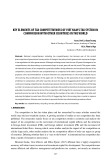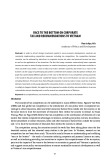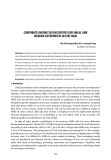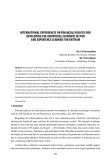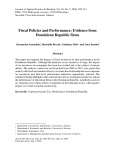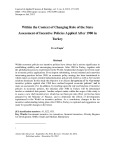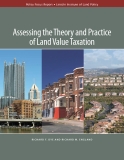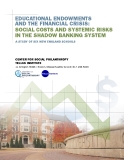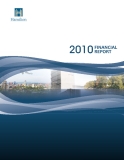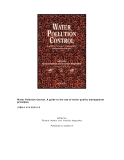
Tax incentives policies
-
The research paper examines the potential implications of the Global Minimum Tax on the tax regime and investment landscape in Vietnam. The study surveyed large-scale FDI companies in Vietnam and revealed the utmost concern of foreign investors on the potential application of Pillar 2 in Vietnam, which is about the prevailing incentive schemes being left inefficient. As a result, FDI attraction competitiveness might be undermined in certain aspects.
 13p
13p  longtimenosee09
longtimenosee09
 08-04-2024
08-04-2024
 2
2
 1
1
 Download
Download
-
The paper "Key elements of tax competitiveness of Viet Nam’s tax system in comparison with other countries in the world" studies the theoretical issues of tax competition, especially clarifies the key elements and constituent factors of tax competition, assesses Vietnam’s tax competitiveness in comparison with other countries in the world and proposes some recommendations to ensure Vietnam’s tax competitiveness in the most beneficial way to the economy
 15p
15p  nhanchienthien
nhanchienthien
 25-07-2023
25-07-2023
 5
5
 4
4
 Download
Download
-
Research results show that Vietnam’s corporate income tax incentive policy has been applied quite effectively, especially in attracting investment, promoting economic growth and realising social goals. However, to meet the requirements of sustainable economic development, corporate income tax incentive policy in Vietnam should be reconsidered to improve properly. Some major solutions would given after the results and discussion in the research.
 10p
10p  nhanchienthien
nhanchienthien
 25-07-2023
25-07-2023
 8
8
 4
4
 Download
Download
-
The results show that although corporate income tax rates in many countries, including Vietnam, have been continuously adjusted for a long time, there is a «race to the bottom» in the coming time is unlikely to happen. Besides, the paper has also proposed a number of policy recommendations to ensure sustainable economic development as well as ensure tax competitiveness of Vietnam.
 9p
9p  nhanchienthien
nhanchienthien
 25-07-2023
25-07-2023
 5
5
 2
2
 Download
Download
-
Corporate income tax incentives are considered as the general trend of countries around the world. Over the years, Viet Nam has had many preferential policies on income tax rates for domestic enterprises, especially small and medium-sized enterprises. This is an important measure to promote the development of these enterprises. This document use the method of synthesis of documents in order to analyse the effectiveness of these incentives.
 7p
7p  nhanchienthien
nhanchienthien
 25-07-2023
25-07-2023
 7
7
 4
4
 Download
Download
-
This article uses a meathical approach to study documents on the experiences of countries such as USA, Russia, China, Singapore ... in the planning of financial policies that support and promote individual economic development. The author has pointed out the financial support in countries including direct support from the state budget and indirect support in the form of tax incentives, credit assistance.
 14p
14p  nhanchienthien
nhanchienthien
 25-07-2023
25-07-2023
 7
7
 3
3
 Download
Download
-
After completing this chapter, students will be able to: Describe how the Scarcity Principle applies to choices involving health, use the incentive principle to explain why health care costs have been rising so rapidly, discuss pollution taxes and effluent permits as a means to reduce the cost of improved air quality,...
 39p
39p  tradaviahe15
tradaviahe15
 23-02-2021
23-02-2021
 15
15
 2
2
 Download
Download
-
In this article, the author will analyze and assess the state of affairs of the Government’s preferential tax policies and the tax avoidance in the form of transfer pricing in Vietnam by foreign investors. Following after are recommendations to complete the tax incentive policies and prevent tax avoidance in the form of transfer pricing of foreign investors.
 10p
10p  tamynhan6
tamynhan6
 14-09-2020
14-09-2020
 8
8
 1
1
 Download
Download
-
Chapter 10 - Using economics to make better policy decisions. After completing this chapter, students will be able to: Describe how the Scarcity Principle applies to choices involving health, use the incentive principle to explain why health care costs have been rising so rapidly, discuss pollution taxes and effluent permits as a means to reduce the cost of improved air quality,...
 22p
22p  nanhankhuoctai10
nanhankhuoctai10
 23-07-2020
23-07-2020
 14
14
 1
1
 Download
Download
-
This paper investigated the impact of fiscal incentives on firm performance in the Dominican Republic. Although the literature on tax incentives is large, the impact of tax incentives on companies has been less studied and is the subject of intense debate. The analysis, carried out on the period from 2006 to 2015, uses panel data models with fixed and random effects to evaluate the relationship between corporate tax incentives and firm-level performance indicators opportunely selected.
 15p
15p  nguyenanhtuan_qb
nguyenanhtuan_qb
 09-07-2020
09-07-2020
 19
19
 2
2
 Download
Download
-
In this study the objective is to discuss the question of “to what extent incentive policies applied after 1980 have realised targeted economic policies” and to make an assessment of it. In addition, by touching upon the role and function of incentive policies in economic policies, the situation after 1980 in Turkey will be determined insofar as statistical data permit.
 15p
15p  nguyenminhlong19
nguyenminhlong19
 21-04-2020
21-04-2020
 14
14
 0
0
 Download
Download
-
T he land value tax is a variant of the property tax that imposes a higher tax rate on land than on improve- ments, or taxes only the land value. Many other types of changes in property tax policy, such as assessment freezes or limita- tions, have undesirable side effects, including unequal treatment of similarly situated tax- payers and distortion of economic incentives. Land value taxation would enhance both the fairness and the efficiency of the property tax.
 36p
36p  layon_5
layon_5
 28-03-2013
28-03-2013
 60
60
 6
6
 Download
Download
-
Taxes matter! Nobody seriously doubts this. Yet many finance textbooks keep entirely quiet about tax issues. It is well-known that investors and enterprises strive to maximize their income net of taxes, yet business schools rarely teach their stu- dents how tax effects impact business decisions. Ignoring tax effects will typically lead to investor decisions that are wrong froma real world perspective.
 423p
423p  layon_5
layon_5
 28-03-2013
28-03-2013
 62
62
 15
15
 Download
Download
-
As we have witnessed during this crisis, financial stress can spread easily and quickly across national boundaries. Yet, regulation is still set largely in a national context. Without consistent supervision and regulation, financial institutions will tend to move their activities to jurisdictions with looser standards, creating a race to the bottom and intensifying systemic risk for the entire global financial system.
 104p
104p  mebachano
mebachano
 01-02-2013
01-02-2013
 58
58
 5
5
 Download
Download
-
From a policy perspective, it is crucial to identify whether the reason people behave as they do is primarily the result of lack of knowledge and mastery of relevant financial management techniques, or whether it reflects fundamental aspects of human nature. Only in the former case is conventional financial education an appropriate remedy. Such education might include topics such as the benefits of diversification, the nature of compound interest, the implications of tax incentives, pension planning, the management of credit cards and so forth.
 148p
148p  mebachano
mebachano
 01-02-2013
01-02-2013
 56
56
 4
4
 Download
Download
-
In the wake of the 20-year anniversary of Earth Day in 1990 and the Gulf War shortly thereafter, environmental issues and renewable energy enjoyed renewed interest. Several states enacted new tax credits and began new loan and grant programs. In the late 1990s, states continued to take the lead in developing programs, policies, and incentives to promote the use of renewable energy, in part as a result of electric utility restructuring.
 67p
67p  mebachano
mebachano
 01-02-2013
01-02-2013
 38
38
 4
4
 Download
Download
-
Financial incentives are an important tool that can help individuals and businesses overcome the barrier of high initial equipment costs for these technologies. But, to be effective, these incentives should be considered as one component in a comprehensive approach to creating a sustainable market.
 266p
266p  mebachano
mebachano
 01-02-2013
01-02-2013
 46
46
 5
5
 Download
Download
-
At the same time, however, economists were proposing effluent taxes as a policy that could both generate incentives to meet ambient quality targets and minimize the costs of doing so. Moreover, proponents of effluent fees received a receptive hearing in the political arena. The Environmental Pollution Panel of the President’s Science Advisory Committee recommended in 1965 “that careful study be given to tax-like systems in which all polluters would be subject to ‘effluent charges’ in proportion to their contribution to pollution ….
 44p
44p  saimatkhauroi
saimatkhauroi
 01-02-2013
01-02-2013
 60
60
 5
5
 Download
Download
-
Economists have long advocated pollution taxes as a policy to improve water quality. One of the reasons water effluent taxes are embraced by economists interested in market-based policies is that sources of water pollution are varied and difficult to assess individually in terms of control costs. In principle, taxes overcome this problem. With a price—the tax—applied to pollution emissions, firms compare the price to their costs of emissions control. If the price is higher than control costs, they reduce emissions rather than pay the tax.
 431p
431p  saimatkhauroi
saimatkhauroi
 01-02-2013
01-02-2013
 60
60
 12
12
 Download
Download
-
In this paper we review the fiscal evolution of China and Russia, asking how the process of creating a separate, tax-financed public sector in the two countries differed. We observe that the size of China's budget sector was consistently smaller than in Russia and that budget decentralization was consistently greater. We see both pros and cons in China's decentralization. Local governments that were allowed to keep marginal increases in local tax revenue had incentives to pursue growth-supporting policies, including support for foreign investment and export-oriented production.
 48p
48p  machuavo
machuavo
 19-01-2013
19-01-2013
 53
53
 5
5
 Download
Download
CHỦ ĐỀ BẠN MUỐN TÌM









